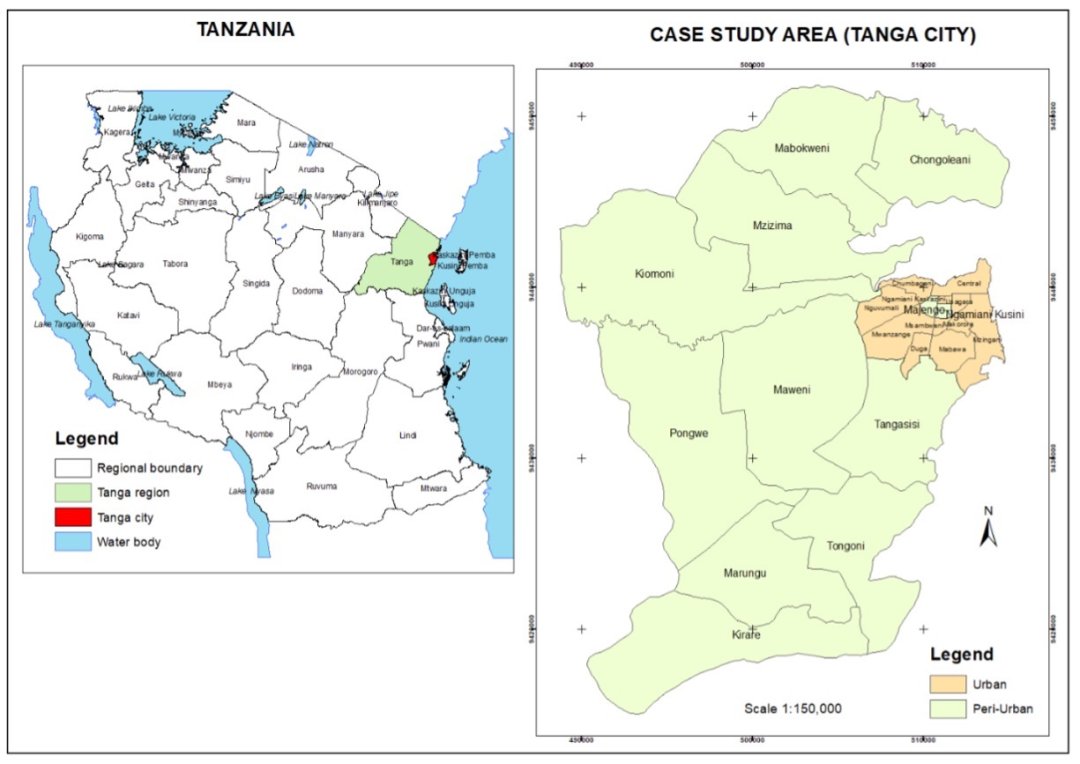About this CARP project
 Like other cities in low-income countries, inhabitants of informal peri-urban areas of Tanga City, Tanzania, are most affected by CC due to poverty, overdependence on climate-sensitive natural resources, and poor governance, which limits their adaptive capacity, thus making them more vulnerable. There is limited knowledge of how CC affects their livelihoods and the measures they take to adapt to CC impacts and cope with climate-induced disasters. This knowledge is important for informing improvement of existing initiatives of community CCA strategies and enabling local authorities to help urban residences’ efforts to adapt to CC. Therefore, the overall objective is to investigate community initiatives for autonomous CC impacts adaptation and coping strategies for climate-induced disasters of people living in peri-urban areas of Tanga city with a view to co-developing novel approaches for enhancing community-based adaptation capacity and resilience.
Like other cities in low-income countries, inhabitants of informal peri-urban areas of Tanga City, Tanzania, are most affected by CC due to poverty, overdependence on climate-sensitive natural resources, and poor governance, which limits their adaptive capacity, thus making them more vulnerable. There is limited knowledge of how CC affects their livelihoods and the measures they take to adapt to CC impacts and cope with climate-induced disasters. This knowledge is important for informing improvement of existing initiatives of community CCA strategies and enabling local authorities to help urban residences’ efforts to adapt to CC. Therefore, the overall objective is to investigate community initiatives for autonomous CC impacts adaptation and coping strategies for climate-induced disasters of people living in peri-urban areas of Tanga city with a view to co-developing novel approaches for enhancing community-based adaptation capacity and resilience.
Study site
Tanga City, Tanga Region, United Republic of Tanzania.
Main Research Questions
- What are the climate variability and change and hazards affecting communities of peri-urban areas in Tanga City?
- What climate change adaptation measures and coping mechanisms for climate-induced disasters are applied by communities of peri-urban areas of Tanga City?
- How do CC impacts link with social vulnerability, livelihoods of people dependent on climate-sensitive natural resources, and institutional and governance dimensions for adaptation?
- How can these strategies be improved to enhance CC adaptation and resilience to climate-induced disasters?
- What is the current capacity of Tanga City Council (TCC) to support residents to adapt to CC and cope with disasters, and how can it be enhanced?
Dependence on climate-sensitive natural resources, rudimentary economies, and poor governance of resources limit the climate change adaptive capacity of many SSA countries, making them more vulnerable to climate-induced disasters. This Project seeks to investigate how climate variability, and change, and hazards affect communities of peri-urban areas in Tanga City as well as adaptation measures and mechanisms for coping with climate-induced disasters with a view to improving them for enhancing communities’ adaptative capacity and resilience. Anticipated outcomes of the Project include improved climate change adaptation measures and resilience to climate-induced disasters for peri-urban residents/communities; enhanced awareness and capacity of Tanga City Council to support community adaptation to CC and cope with climate-induced disasters; Tanga’s local authorities will become more aware of the impacts of their activities on residents’ adaptive capacity; and, improved and sustainable harnessing of natural resources for supporting livelihoods under the climate crisis.

Gabriel R. Kassenga
Professor
Ardhi University, Tanzania
Principal investigator
gabriel.kassenga@aru.ac.tz
Kassengagr@gmail.com

Guido Uhinga
Researcher
Ardhi University

Given Mhina
Lecturer
Ardhi University

Tumpale Sakijege
Senior Lecturer
Ardhi University

Nicholaus Mwageni
Lecturer
Ardhi University

Benedict Malele
Researcher
Ardhi University

Rosemary Kiama
PhD student
Ardhi University

Dionis Rugai
Assistant Lecturer
Ardhi University

Neema Kijazi

